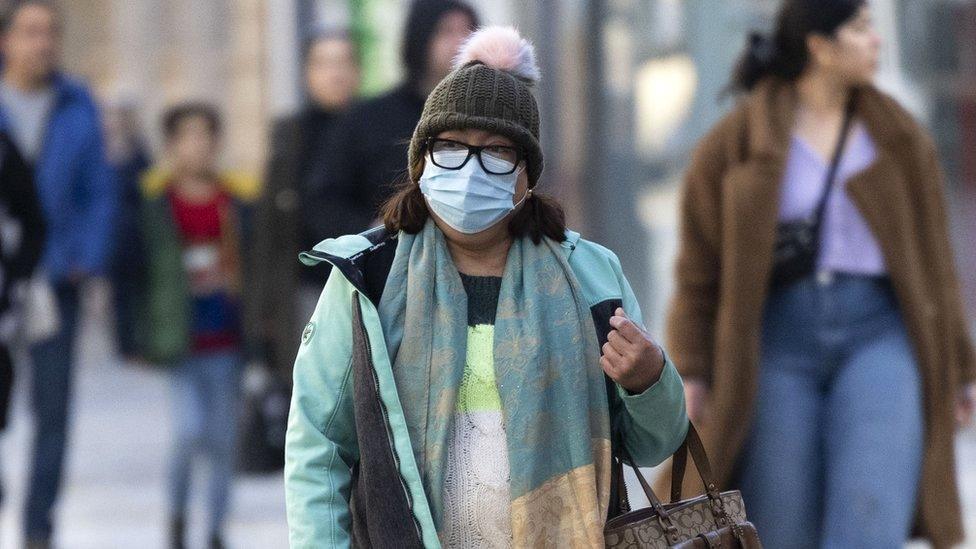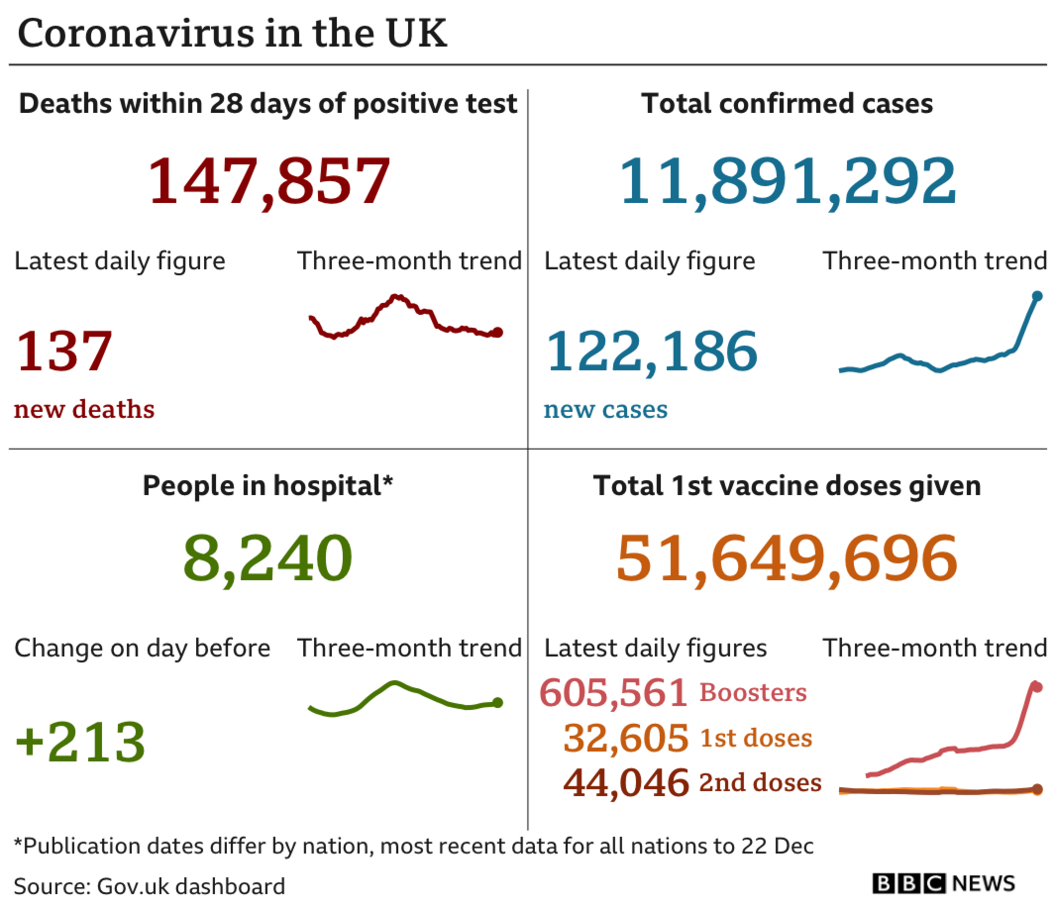No new Covid rules to be announced in England on Monday
- Published

No further Covid restrictions will be announced in England on Monday, the BBC understands.
Prime Minister Boris Johnson is being briefed on the latest Covid data this afternoon, after two days without published figures.
Ministers are expected to continue regular meetings with scientists, and keep the data under review.
Meanwhile, Scotland and Northern Ireland have tightened rules for a second day.
In both nations hospitality venues have returned to table service only and social distancing has been reintroduced in several settings.
Nightclubs have also been closed in Scotland, Northern Ireland and Wales.
BBC political correspondent Ione Wells said the lack of new legal restrictions for England on Monday did not rule out more guidance, or stronger language urging people to be careful.
Only partial Covid data has been published for the Christmas period. But figures show that the number of cases has remained high, with 113,628 infections reported in England on Christmas Day.
Some 103,558 cases were recorded in England on 26 December and 98,515 on 27 December.
Meanwhile, the Scottish government said provisional data suggested Christmas weekend had seen the highest daily cases recorded in Scotland since the start of the pandemic.
First Minister Nicola Sturgeon said the expected wave of cases fuelled by the Omicron variant was "materialising".
Downing Street previously said it would not hesitate to act after Christmas if necessary.
England's current guidance - known as Plan B - requires people in England to work from home, wear face coverings in shops and other public settings and present Covid passes to gain entry to large events.


The data emerging in England points to a very difficult month ahead for the NHS, but not a completely overwhelming one.
Last week, estimates were published suggesting Omicron was causing milder illness.
But it was unclear what that would translate to in the real world - if infections rose high enough, there was still a threat the NHS would not be able to cope.
The latest data in London, which was the first to see an Omicron wave, gives us an indication of what to expect.
The first half of December saw the number of cases detected double week-on-week.
But the growth in hospital admissions - even when you take into account the lag between initial infection and becoming seriously ill - has been much lower at around two-thirds.
And those who are admitted appear to be spending less time in hospital.
What's more, the increase in infections appears to have started levelling off before Christmas.
If this is right and the trends hold and the same pattern is repeated elsewhere, it would suggest hospital numbers will peak at under half of what was seen last winter.
That, though, is a lot of ifs. But it looks like it has been enough to convince ministers more restrictions cannot be justified at this point.

The briefing by scientific advisers on Monday is one of a regular series of updates given to the prime minister, and he has not yet called a cabinet meeting or announced a recall of Parliament.
MPs have been promised a vote if it is decided fresh legal measures are needed, after Mr Johnson suffered the largest rebellion since he became PM over the introduction of Covid passes earlier this month.
Some business owners have called for clarity as they plan ahead for New Year's Eve.
Paul Kemp, owner of Beerd bar in Bristol, told the BBC: "People need to know now, they've got staff that they need to put in place, they've got security that they need to book, they've got stock that they need to order. He needs to tell people now, right now so they know what they are doing."
Early findings last week suggested people infected with the fast-spreading Omicron variant were less likely to be admitted to hospital - although a range of factors is likely to be examined when looking at the case for restrictions.

Omicron: What we know so far
This variant is very contagious - it spreads faster than others and can infect people even if they are fully vaccinated
Vaccines and boosters are still essential - they do a great job at protecting against severe disease that could put you in hospital
It is milder - if you catch it, the risk of needing hospital treatment is up to 70% lower than with previous variants - but that is largely because many of us have built up immunity from vaccines and past infections rather than changes to the virus
Even if Omicron is milder, because it is more contagious a large number of people will catch it and some will still become very ill, which puts pressure on the NHS.

The UK has massively ramped up its booster programme in response to Omicron, which was first identified in South Africa just one month ago.
A record 968,665 booster jabs and third doses were reported in one day last week, and the NHS said a further 1.5 million vaccination slots were available to book in England in the coming days.
In a tweet, the prime minister said: "We know two jabs don't give you enough protection against Omicron so whether it's your first, second or booster jab I urge you to book an appointment now."
Meanwhile, there were no walk-in PCR tests available to book in England for a few hours on Monday due to "high demand".
Appointments were temporarily unavailable in every region of England, but the UK Health Security Agency said the issue was now resolved.


A VERY BRITISH SCANDAL: One of the most notorious and brutal legal cases of the 20th Century
A STUNNING WINTER WALK: Shepherdess Amanda Owen takes us through the Yorkshire Dales
